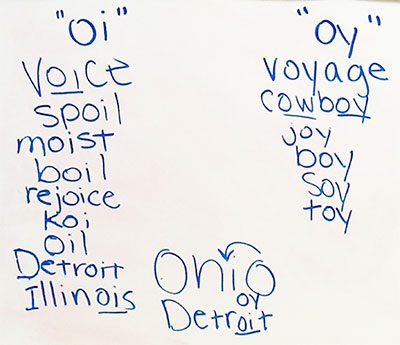SHS Outreach Helps Children, Adults
 Through its clinic services and community-based programs, the Department of Speech and Hearing Science has demonstrated its commitment to improving the quality of life for people with communication difficulties.
Through its clinic services and community-based programs, the Department of Speech and Hearing Science has demonstrated its commitment to improving the quality of life for people with communication difficulties.
Clinical instructor Clarion Mendes brought her expertise in the provision of services to adults with communication disorders to the Speech-Language Pathology Clinic. “With her hiring, we have made a commitment to building an adult caseload,” said Dr. Karen Kirk, Shahid and Ann Carlson Khan Professor and head of the Department of Speech and Hearing Science. “This not only will better utilize clinic facilities, but also broaden clinical experiences for our master’s students in speech-language pathology.”
In addition to expanding its staff and services, the Speech-Language Pathology Clinic now has a Twitter account (https://twitter.com/Illinois_SLPs) which includes links to interesting information about communication disorders as well as announcements about community engagement activities. Both the Speech-Language Pathology Clinic and the Audiology Clinic staff participate in health fairs and give workshops in order to connect more effectively with community members who may need services. Last year, hearing aid sales and services increased substantially because of this outreach.
Community programs support children and adults
In addition to clinical services, SHS students, clinical instructors, and faculty are leading programs that boost literacy skills among elementary school students and help adults with acquired communication disorders improve their interactions with friends and family.
Word Transformers
Many students take their first formal steps toward reading in the first grade. In second grade, teachers focus on helping students become more fluent readers so that by the third grade, they have developed strategies for dealing with unfamiliar words and developing meaning. Children who lag behind their peers in reading skills may also find themselves getting significantly behind in other subjects as well.
When a child’s reading difficulty is related to a language or learning impairment, SHS clinical instructor Patricia Cetin and her graduate clinicians may work with them in the University of Illinois Speech-Language Pathology Clinic. What about students whose reading difficulties are not identified as disorders?
“I wanted to reach children who might not have diagnosed communication delays or disorders but are struggling with reading nonetheless,” Cetin said. “I also wanted to take my graduate students out into the community to expand their clinical experiences.”
In collaboration with Professor Cynthia Johnson, Cetin developed a research-based intervention called Word Transformers. The intervention focuses on increasing children’s morphological awareness, that is, showing them how a root word such as “happy” can be transformed into different words by adding prefixes and suffixes: unhappy, happily, unhappily, and so on. Through this instruction, children learn a strategy for decoding long words by breaking them down into recognizable chunks. Pilot tests with small groups of native and non-native speakers of English received positive reviews from teachers and administrators.
During the spring semester, they and doctoral student Mary Kubalanza—who will continue her academic career in the fall as an assistant professor at the California State University, Los Angeles—took an expanded version of Word Transformers to the after-school program at Garden Hills Elementary in Champaign. With funding from the University of Illinois Office of Public Engagement, they were able to work with children for two hours a week over 12 weeks.
The ultimate goal of Word Transformers is to use the building blocks of morphological awareness to increase children’s fluency with reading and, consequently, their comprehension. Using the Champaign district’s tool for evaluating reading comprehension, pre- and post-tests of the Word Transformers program showed accelerated growth in 90 percent of the students in the program. The program will continue this fall at Garden Hills Elementary.
Talking Circles
For adults who suffer strokes or brain injuries or who may develop chronic neurological diseases such as Parkinson’s, one of the many frustrating challenges they’ll face is rebuilding or preserving their ability to communicate. Speech-language pathologists work intensively with these individuals to help them recover old communication strategies or develop new ones. Doctoral student Suma Devanga wanted to augment these services by providing adults with acquired communication disorders supportive group settings in which to practice.
Working with Dr. Julie Hengst, Devanga developed a program called Talking Circles, for which she was selected as a 2014-2015 Chancellor’s Public Engagement Student Fellow. These informal groups use planned activities to complement the services participants are already receiving. “Through Talking Circles, adults with acquired communication disorders have the opportunity for informal social interaction,” Devanga said. “We encourage them to share stories, both verbally and in writing, watch and discuss videos, and play games.”
Devanga says nearly 20 individuals regularly take part in Talking Circles. She has partnered with the Champaign County Nursing Home and Carle Foundation Hospital to offer Talking Circles to nursing home residents and to participants in Carle Therapy Services’ Conversational Group. For academic year 2015-2016, she hopes to help even more people increase the success and positivity of their interactions with friends and family.